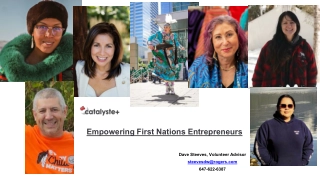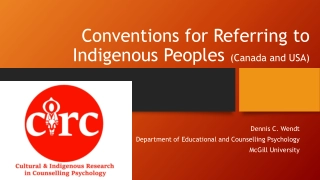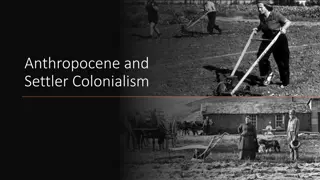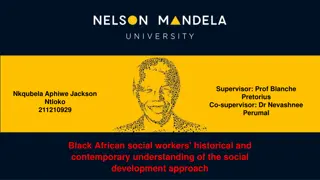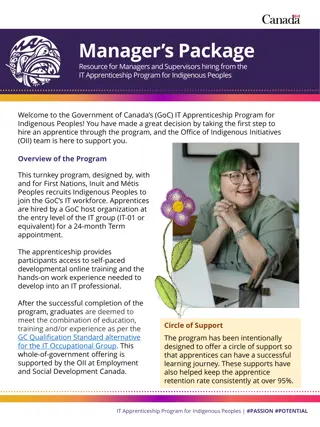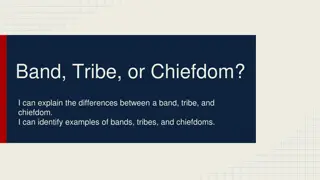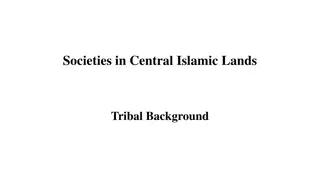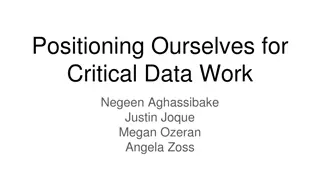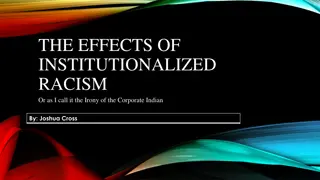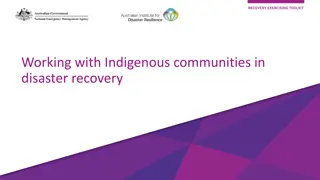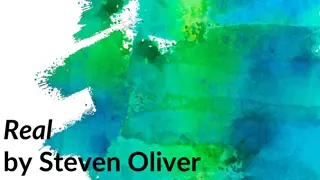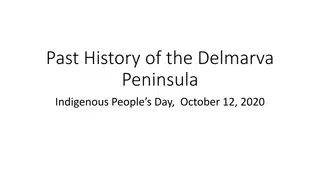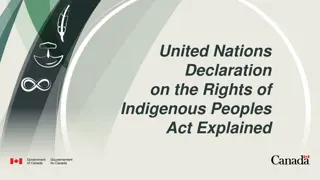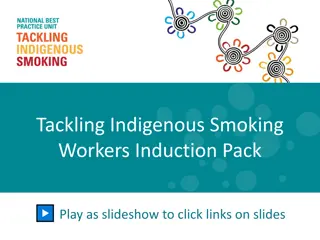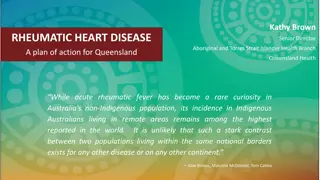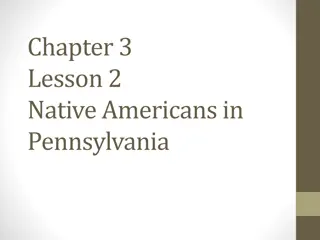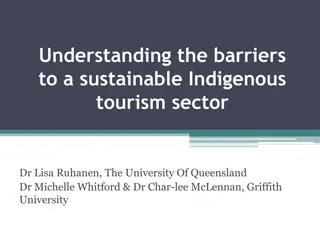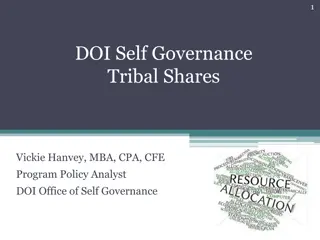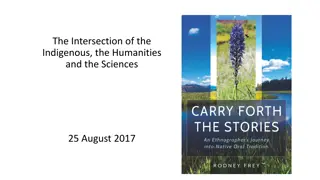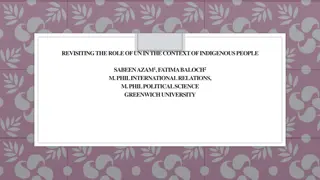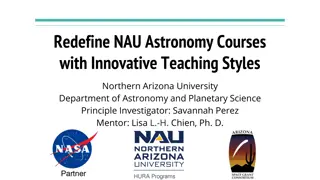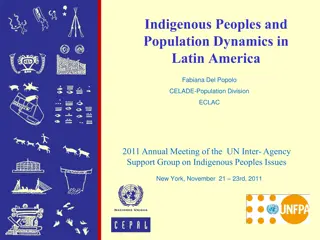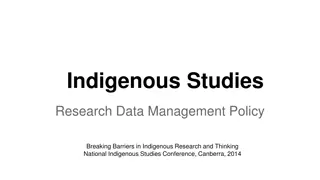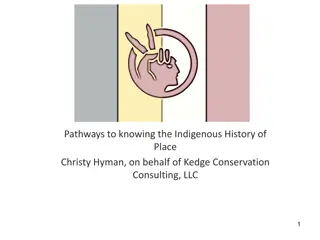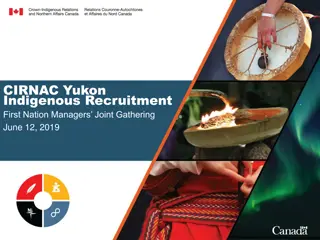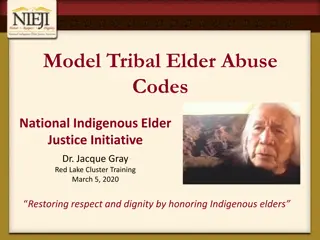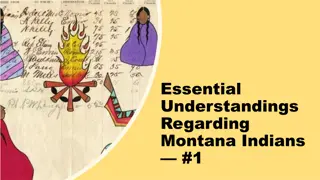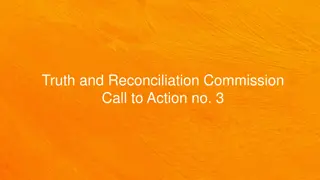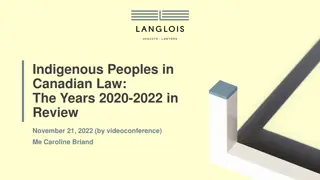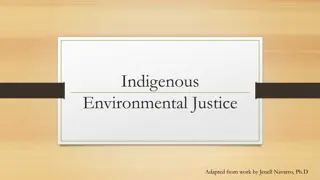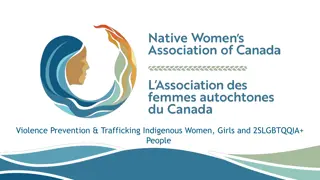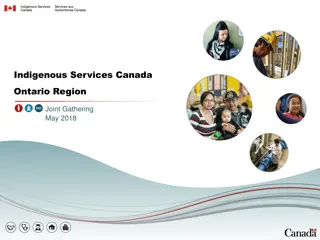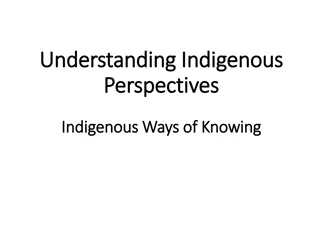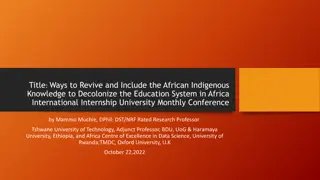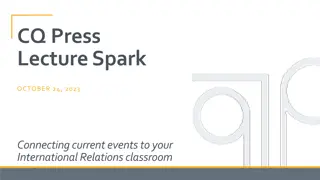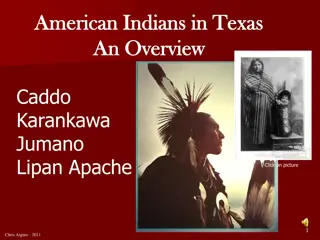Empowering First Nations Entrepreneurs
Empowering First Nations Entrepreneurs is a program by OFNEDA, a Canadian economic development organization, providing guidance and support to Indigenous entrepreneurs. The initiative matches Indigenous partners with experienced volunteer advisors to enhance capacity-building and facilitate communit
0 views • 28 slides
Conventions for Referring to Indigenous Peoples in Canada and the USA
This article outlines guidelines for referring to Indigenous Peoples, emphasizing specificity and respect for preferred names and terms. It discusses the importance of capitalizing terms related to Indigenous Nations and cautions against using terms implying colonial possession. The use of terms lik
1 views • 24 slides
Understanding Settler Colonialism and Its Impact in the Anthropocene
Settler colonialism, a structure of domination, aims to permanently transfer settlers to Indigenous lands, leading to ongoing dispossession and conflict. This form of colonialism disrupts Indigenous nationhoods, political practices, and sovereignties. The dispossession of Indigenous bodies and lands
0 views • 8 slides
Social Development Challenges in South Africa: Embracing Indigenous Knowledge
South Africa's social welfare policies have been influenced by colonialism and apartheid, leading to a disconnect between Western social thought and indigenous African practices. This study aims to empower Black Africans in the social work sector, promoting the integration of indigenous knowledge sy
1 views • 22 slides
Indigenous IT Apprenticeship Program Overview
The Government of Canada's IT Apprenticeship Program for Indigenous Peoples offers a comprehensive 24-month term appointment to develop Indigenous individuals into IT professionals. Supported by the Office of Indigenous Initiatives, the program provides hands-on work experience and online training,
0 views • 6 slides
Social Organization: Bands, Tribes, and Chiefdoms Explained
In social organization, cultures have evolved through bands, tribes, and chiefdoms. Bands are small, egalitarian groups practicing hunting and gathering. Tribes support larger populations with agrarian lifestyles and temporary land ownership. Chiefdoms, the most complex, are stratified societies wit
1 views • 11 slides
Origins and Tribes of Central Islamic Lands: A Historical Overview
Explore the origins of Jewish tribes in Saudi Arabia, the diverse tribal backgrounds in Central Islamic lands, and the cultural landscape of pre-Islamic societies in the Arabian Peninsula. Discover the ancient civilizations, dominant tribes, and sources of historical evidence that shed light on the
0 views • 23 slides
Understanding Positionality and Indigenous Data Sovereignty in Critical Data Work
Explore the impact of positionality on data work, challenge notions of value-free research, and address issues of erasure and harm in Indigenous data sovereignty. Reflect on how personal values and experiences influence data understanding, and consider the rights of Indigenous peoples in owning and
5 views • 8 slides
Unveiling the Effects of Institutionalized Racism on Indigenous Peoples
Delve into the intricate web of institutionalized racism faced by Indigenous communities, exploring key concepts like covert racism versus operant racism, decolonization, and settler benefits. Learn how historical injustices, such as the Indian Act, continue to impact Indigenous autonomy and the fig
9 views • 21 slides
Understanding Indigenous Communities in Disaster Recovery
Increased understanding of intrinsic strengths and unique impacts of disasters on Indigenous communities, role of Indigenous community-controlled organizations, importance of connection to Country, and need for engagement with Indigenous communities by emergency management agencies. Disasters have u
0 views • 21 slides
Exploring Indigenous Identity Through Steven Oliver's "Real
Delve into the artistic prowess of Indigenous poet and rapper Steven Oliver through his work "Real". Explore how Oliver challenges social narratives, redefines cultural ideals, and advocates for change, all while sharing his Indigenous identity in a variety of creative forms.
0 views • 8 slides
Uncovering the Past: Indigenous History of the Delmarva Peninsula
Delve into the rich indigenous history of the Delmarva Peninsula, acknowledging the injustices and hardships faced by Native American communities. From Columbus' invasion to the Trail of Tears, explore the impact of colonization on indigenous peoples and the ongoing efforts to address historical mis
0 views • 15 slides
Understanding the United Nations Declaration on the Rights of Indigenous Peoples Act
The United Nations Declaration on the Rights of Indigenous Peoples Act, effective from June 21, 2021, aims to protect and promote Indigenous rights, including self-determination and equality. Key elements include the preamble emphasizing reconciliation, interpretive elements in Section 2, and the de
1 views • 13 slides
Indigenous Smoking Workers Induction Pack Slideshow
Explore the Indigenous Smoking Workers Induction Pack through a slideshow with clickable links. Navigate through background information, planning tools, evidence-based activities, monitoring and evaluation resources, and development opportunities. Dive into facts about smoking, the Tackling Indigeno
0 views • 7 slides
Addressing Rheumatic Heart Disease Disparities in Indigenous Australians
Rheumatic heart disease (RHD) continues to disproportionately affect Indigenous Australians, particularly those living in remote areas, with a high incidence compared to the non-Indigenous population. Acute Rheumatic Fever (ARF) is a key precursor to RHD, often linked to social determinants and poor
0 views • 7 slides
Relationship Between Health and Deaths in Custody in Australia
In Australia, the relationship between prisoner health and deaths in custody is a critical issue. Indigenous inmates are disproportionately affected, with higher death rates compared to non-Indigenous inmates. Addressing prisoner health may offer a potential solution to reducing custodial deaths. Th
0 views • 32 slides
Land Acknowledgement at University of Arizona
The University of Arizona respectfully acknowledges it is on the land of Indigenous peoples in Arizona, home to 22 federally recognized tribes. Prioritizing diversity and inclusion, the university aims to foster sustainable relationships with Native Nations and Indigenous communities through educati
0 views • 6 slides
Native American Life in Pennsylvania: Agriculture, Wampum, and Tribes
Explore the rich history of Native Americans in Pennsylvania, from their arrival after the Ice Age to the cultivation of agriculture, use of wampum for decision-making, and the unique lifestyles of different tribes like the Algonquian and Iroquois. Discover fascinating details about their traditions
1 views • 18 slides
Understanding Barriers to Sustainable Indigenous Tourism Sector
Globally, tourism is seen as an opportunity for Indigenous communities. However, barriers such as economic challenges, declining demand, and competition pose significant obstacles. Research conducted in Australia aims to analyze the gap between supply and demand in Indigenous tourism and explore the
0 views • 15 slides
Overview of Tribal Self-Governance Program and PROGRESS Act
The Tribal Self-Governance Program, under the Indian Self-Determination and Education Assistance Act, allows tribes to operate services efficiently. The PROGRESS Act, signed into law in 2020, enhances self-governance and self-determination for Indian tribes by creating administrative efficiencies. I
0 views • 14 slides
Exploring the Intersection of Indigenous, Humanities, and Sciences
The narrative delves into the rich tapestry where Indigenous traditions, Humanities, and Sciences meet, highlighting the contrast in approaches like logical reasoning in Sciences, spiritual origins in Indigenous knowledge, and interpretive wisdom in Humanities. It emphasizes the holistic, narrative-
0 views • 9 slides
Settler Colonialism and Carcerality: Disrupting Indigenous Relationships and Territories
This study delves into the impact of settler colonialism on Indigenous peoples, focusing on the immobilization and movement imposed on them through carceral spaces. It explores the intersections of official and unofficial carceral spaces, shedding light on the disrupting effects on Indigenous relati
0 views • 8 slides
The Role of UN in Indigenous Peoples: A Critical Analysis
The research delves into the role of the United Nations in addressing the unique social, cultural, economic, and political qualities of indigenous peoples worldwide. It discusses the importance of recognizing indigenous rights, traditions, and the challenges they face in contemporary societies, emph
0 views • 7 slides
Innovating Astronomy Education at NAU Through Indigenous Perspectives
Explore how Northern Arizona University is reshaping astronomy education using innovative teaching styles with a focus on Indigenous Astronomy. Gain insights into effective teaching methods, the importance of Indigenous Astronomy lab content, teaching approaches, and creating engaging lab materials.
0 views • 7 slides
Indigenous Peoples and Population Dynamics in Latin America
Latin America is a region with diverse indigenous groups, facing demands for recognition and rights. The importance of information, especially from censuses, is crucial for developing policies and programs to support indigenous peoples. Various data sources such as censuses, surveys, and registries
0 views • 19 slides
Indigenous Studies Research Data Management Policy: Breaking Barriers in Indigenous Research
Covering cultural rights, Indigenous data custodianship, policy developments, and ATSILIRN protocols, this presentation at the National Indigenous Studies Conference in 2014 highlights key issues and approaches in managing research data in Indigenous studies.
0 views • 61 slides
Understanding the Impacts of Colonialism on Indigenous Communities
The article delves into how East Coast Indigenous communities were profoundly affected during the colonial period and beyond, enduring forced removals, enslavement, attempted genocide, and subjugated statuses. It explores the historical realities that continue to shape the presence and representatio
0 views • 18 slides
Indigenous Recruitment Action Plan Overview
CIRNAC Yukon developed an Indigenous Recruitment Action Plan focusing on three themes: Outreach, Renewing the job advertisement, and Mentorship. The plan includes various activities such as attending job fairs, partnering with colleges, and creating employee profiles to attract local Indigenous cand
0 views • 12 slides
Indigenous Elder Abuse Codes and Civil Court Procedures
The National Indigenous Elder Justice Initiative aims to restore respect and dignity by honoring Indigenous elders. The initiative identified 47 tribes with existing Elder Abuse Codes in 2012, which has now expanded to 100 tribes across 27 states. The Civil Elder Abuse Code outlines reporting duties
0 views • 78 slides
Understanding the Diverse Montana Indian Tribes
The twelve sovereign tribes of Montana boast great diversity in languages, cultures, histories, and governance, each contributing a unique cultural heritage to modern Montana. Explore the richness and distinctiveness of Montana's indigenous peoples.
0 views • 11 slides
University of Arizona Land Acknowledgement
The University of Arizona respectfully acknowledges the land and territories of Indigenous peoples, emphasizing the presence of 22 federally recognized tribes in Arizona, with a commitment to fostering sustainable relationships with Native Nations and Indigenous communities through education, partne
0 views • 6 slides
Call to Implement Jordan's Principle for Indigenous Children
The Truth and Reconciliation Commission's Call to Action No. 3 emphasizes the need for all levels of government to fully implement Jordan's Principle, which prioritizes the needs and well-being of Indigenous children. Highlighting the story of Jordan River Anderson, the call underscores the importan
0 views • 19 slides
Indigenous Rights Litigation in Canadian Law: A Review of 2020-2022
Strategic considerations in Indigenous rights litigation, social acceptability in decision-making, Indigenous identities, and future expectations were discussed in a review from November 21, 2022. The case of Southwind v. Canada highlighted issues of fiduciary obligations and equitable compensation
0 views • 50 slides
Understanding Indigenous Environmental Justice & Biodiversity Interconnection
Exploring the intricate relationship between Indigenous environmental justice, biodiversity, and cultural diversity as discussed by Jenell Navarro, Ph.D., and Winona LaDuke. The impact of settler colonialism, capitalism, and loss of Indigenous populations on environmental degradation is highlighted.
0 views • 9 slides
Understanding Violence Prevention and Trafficking in Indigenous Communities
Explore key terms like assimilation, colonialism, discrimination, grooming, and human trafficking in the context of Indigenous women, girls, and 2SLGBTQQIA+ people. Learn about concepts such as intergenerational trauma, patriarchy, racism, and settler colonialism that impact these communities. Under
0 views • 32 slides
Indigenous Services Canada Achievements and Initiatives Overview
Indigenous Services Canada in Ontario region held a joint gathering in May 2018, leading to the formation of a new department focusing on improving health outcomes for Indigenous communities. The department has made significant strides in enhancing services such as healthy child development, mental
0 views • 25 slides
Exploring Indigenous Knowledge in Education
Delve into Indigenous ways of knowing, understanding, and learning, emphasizing the importance of integrating traditional Indigenous pedagogies in education. Learn about the characteristics, sources, and values of Indigenous knowledge, and explore the intersection of Indigenous knowledge with Wester
0 views • 46 slides
Reviving African Indigenous Knowledge for Decolonizing Education
Mammo Muchie, a distinguished DPhil and research professor, will address the urgent need to revive African Indigenous Knowledge within the education system to decolonize it effectively. The conference will explore the key characteristics of Indigenous Knowledge, highlight the exemplary model of Imho
0 views • 84 slides
Australians Reject Indigenous Advisory Panel: Impact & Challenges
Australians recently voted against establishing an Indigenous advisory panel, highlighting inequities faced by Indigenous Australians. The referendum faced misinformation and lacked clarity on its benefits. The rejection raises questions on addressing Indigenous issues, impacting Australia's global
1 views • 5 slides
Indigenous Peoples of Texas: Caddo and Karankawa Tribes Overview
Explore the rich history of the Caddo and Karankawa tribes in Texas. Learn about their way of life, including housing, food sources, and hunting practices. Discover how these indigenous peoples shaped the region.
0 views • 17 slides
